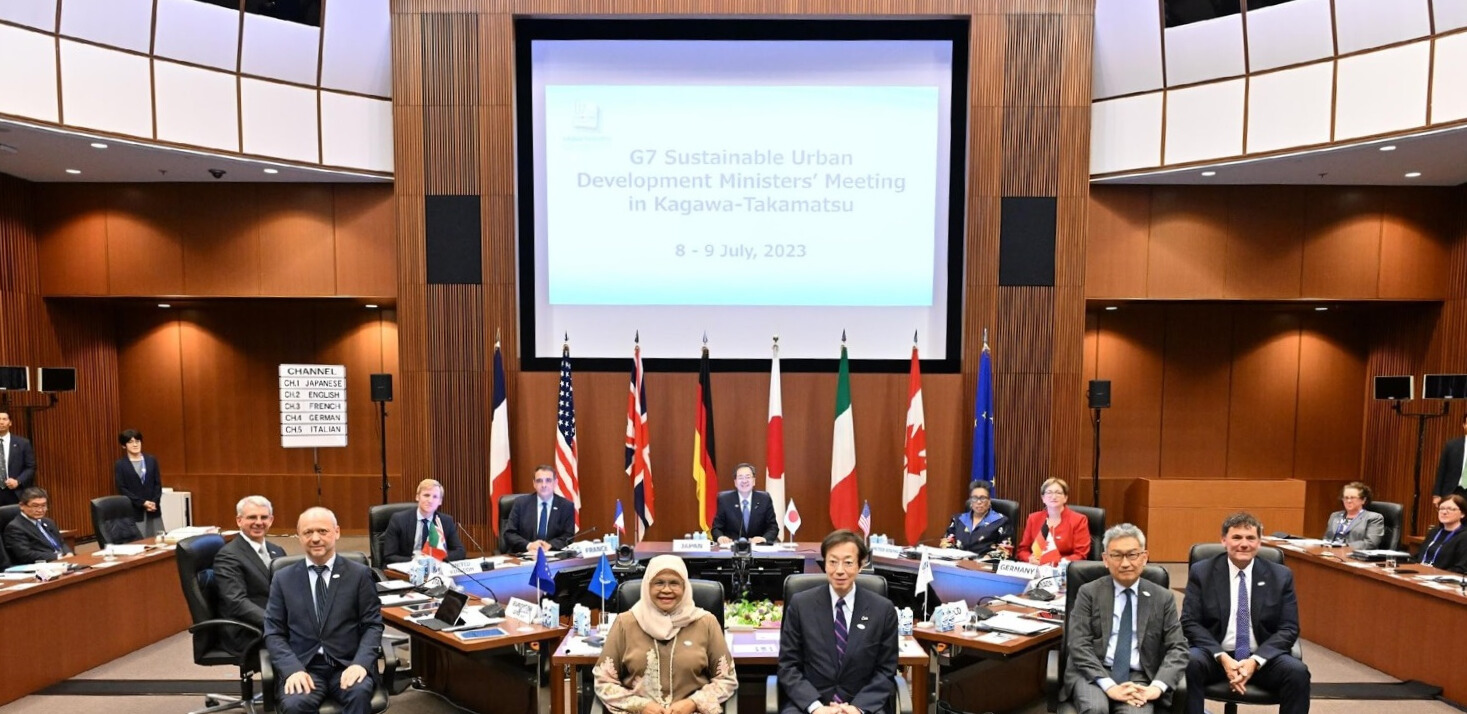
With recognition of the vital role of both subnational and national governments in the climate agenda, the G7 Roundtable on Subnational Climate Actions was established by the G7 Climate, Energy and Environment Ministers Meeting in 2023 under the presidency of Japan. The Roundtable Meeting was held on October 5-6 with participation of not only national governments but also regions, cities and international stakeholders.
Results from that meeting were announced December 2 with the launch of the summary report on G7 Roundtable Meeting on Subnational Climate Actions at the Japan Pavilion at COP28.
October’s Roundtable Meeting was attended by more than 70 participants from national and local governments of G7 members.
Minna Arve, the Mayor of Turku, Finland, and Vice President of ICLEI, who attended the G7 roundtable, emphasized the far-reaching impact of actions taken at the city and local levels, stating, “Everything that we do in cities and at local levels has a strong impact not only locally but nationally and globally as well. As city leaders, we appreciate the format of the multilevel governance dialogues provided by the Japanese G7 presidency and hope that this will be continued under the Italian presidency.”
Under the presidency of Japan in 2023, the G7 has shown a particular recognition of the vital role subnational actors play in climate action and more broadly in sustainable development.
The report identified four key findings from the Roundtable:
- Subnational climate actions reinforce the virtuous cycle by addressing multiple urban challenges and creating synergies, including pollution control, biodiversity, circular economy and economic growth.
- One of the biggest challenges is channeling climate finance to cities. Leveraging private funding with public funding sources using mechanisms such as blended finance, joint public-private financing initiatives, transition funds and guarantee mechanisms are examples of possible solutions. A number of programs have been established by G7 members in support of such initiatives.
- Knowledge sharing through either domestic or international city networking is vital. Collaboration and scaling up of ambitious activities beyond regions should also be encouraged.
- Other elements to enhance ambitions and strengthen implementation at subnational levels include inclusive approaches, technical support, guidance at the national level, local leadership, partnerships, engagement of actors at different levels (i.e., multilevel climate action) and digital transformation.
The summary report was accompanied by an annex of reported policies, measures and actions related to subnational climate action taken by national governments in the G7.
National governments, alongside global platforms like the G7, G20 and entities such as the EU, are eager to join forces with subnational governments. Together, they aim to craft tailored policies that resonate with the diverse needs of local communities, recognizing the pressing need for political leadership at the local level to achieve carbon neutrality by 2030, ensure an inclusive and equitable transition, foster green jobs, and enhance the well-being of residents for effective and just climate action.
Bringing the Urban7 Message to the Global Climate Summit
Two sessions at COP28 brought these findings to a wider global audience.
H.E. Francesco Corvaro, Special Envoy for Climate Change, Italy, emphasized the importance of finding solutions and creating dialogue, highlighting the interconnectedness of efforts at different levels of governance.
When asked about outreach and collaboration beyond G7, local government leaders with national and international climate diplomacy representatives echoed a commitment to global conversations, aiming to replicate and scale successful programs while fostering national and regional policy capacity. The recognition of gaps, exploration of viable options and the solutions already available underscore the need for a clear distribution of responsibilities.
Barbara Buffaloe, Mayor of Columbia, Missouri, emphasized that human connection is key to building bridges because it is fundamentally a people-to-people endeavor with relationships serving as a foundation for collaboration. The call for outreach encompasses more than just governments; it extends to all stakeholders, including residents and the private sector.
As H.E. Francesco Corvaro shared, “We are not able to win alone.” Local governments are positioned as central players in this outreach, capable of not only involving stakeholders but also ensuring that the momentum is shared widely. The success of multilevel collaborations rests on the active involvement of leaders at all levels and the commitment to work together.
This blog was written based on two COP28 sessions: “Triggering an Upward Spiral Towards Decarbonization with Subnational Leaders from the G7 Roundtable on Subnational Climate Actions” at the COP28 Japan Pavilion on December 2, 2023, and “Building Bridges Within G7: Lessons from the Urban7 Cooperation for Ambitious Climate Action in Japan, Europe and the USA” at the Multilevel Action & Urbanization Pavilion. You can watch the livestream of the second session here.
This article originally appeared on ICLEI’s CityTalk.
Anne Marie Cleary Rauker is Communications Officer for ICLEI USA.
Ariel Dekovic is Head of Communications for ICLEI World Secretariat.






